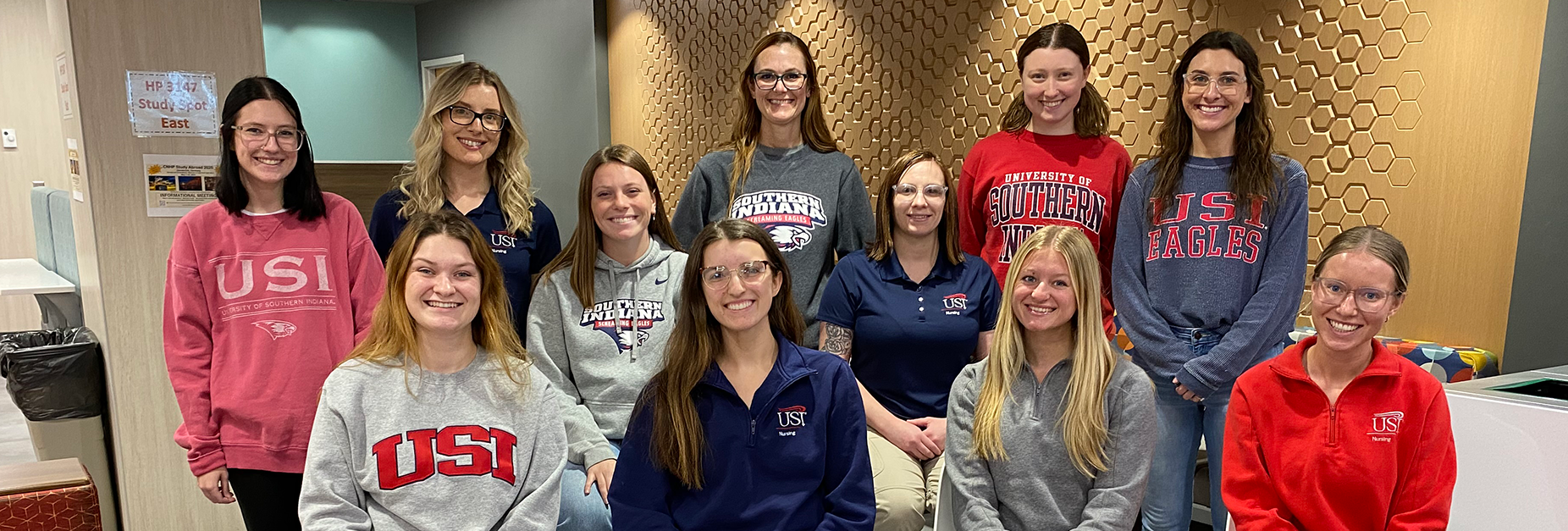
Nursing students boost skills
through College tutoring program
A USI nursing student from Jasper, Indiana, helped plant a seed for a peer tutoring program to boost academic success and morale, an initiative that is still flourishing nine years later. Katie Upton ’16, MSN’21 was inspired to help start the program while enrolled in the Bachelor of Science of Nursing (BSN) Program. “I remember reviewing a pharmacology test with Sue Krieg, one of my former nursing instructors. She said that she wished she could tutor students in the areas they were struggling with,” says Upton. “This statement stuck with me for days. I also remember thinking ‘How did the nurses before us figure these things out?’ That was how the idea of peer tutoring originated.”
While working as a nursing assistant, Upton witnessed instances of newly graduated nurses being bullied by more experienced colleagues. “I wanted to change the culture so that nurses teaching and supporting each other became the standard instead of bullying new nurses for what they do not know,” she says.
Upton is currently enrolled in USI’s Post-Master's Certificate Program (Family Nurse Practitioner specialty). She is a staff nurse at Missouri Baptist Medical Center and teaches in the BSN simulation lab working on an as-needed basis at Maryville University.
Dr. Susan Seibert, Teaching Assistant Professor of Nursing, says USI’s tutoring program is an important part of the wrap-around services of the BSN program to ensure nursing student success. “Our tutors are junior and senior nursing students nominated by faculty based on their academic performance, professional behaviors and exemplary study skills,” she says. “During the sessions, the tutors clarify lecture content, help develop skills, advise on time management and offer encouragement and camaraderie.”
Tutor sessions are held for two hours on Monday afternoons in the Health Professions Building on a walk-in basis. There is also an option to join virtually via Microsoft Teams. As this program has grown in popularity, they now offer additional one-to-one sessions scheduled through the USI’s Academic Success Center.
“Building a professional identity is vital to role socialization and becoming a nurse,” says Seibert. “The nursing peer tutoring program provides a venue for students to connect with other students while developing their knowledge and nursing skills. I have witnessed the impact that these tutors have on their peers' academic success and morale. Our tutors' supportive behaviors are comparable to the team behaviors necessary in the nursing workforce.”
Nursing student Samantha Haas says she agreed to be a tutor to pay it forward. “When I first started the BSN program, I felt overwhelmed and a lot of fear,” she says. “I was scared about how to best study, get organized and navigate the classes. I was grateful to my peers who gave me advice and helped me with concepts I felt confused by. I agreed to become a peer tutor with the hope that I might possibly be able to do the same for incoming students as was done for me.”
Another tutor, Abigail Ruxer, says tutoring is beneficial for all involved. “It’s rewarding to share knowledge in a way that clicks for someone else, and I think tutoring is a great way to reinforce my own understanding, too,” she says. “Plus, I’ve always found that explaining things to others helps me see new perspectives and deepen my grasp on a topic. I’m grateful to be a tutor and provide support for the future nurses!”
Upton is pleased to know the program she helped spearhead in 2015 is still going strong. “It warms my heart to know that USI continues to support the peer tutoring program,” she says. “It also came to my attention that a few former tutors have chosen to pursue the nurse educator specialty because they enjoyed their roles as nursing tutors. It sounds like the vision of nurses teaching each other is alive and well at USI.”
Advice for new nursing students
from the USI Nursing tutors:
Samantha Haas: Trust that you can do this. It is normal to have moments of self-doubt. Don’t feel embarrassed to ask questions. Ask for help and lean on others. Try not to compare yourself to your peers. We all have our strengths and can learn from one another. Practice positive self-talk, be kind to yourself and celebrate your wins, both big and small.
Abigail Ruxer: Lean into the learning process. Nursing is a challenging and sometimes overwhelming field, but it’s also incredibly rewarding. You're learning not just technical skills but also how to provide compassionate care, which takes practice and self-reflection. Don’t be afraid to make mistakes. Mistakes are part of the learning process. Also, self-care is essential. Nursing is demanding, both physically and emotionally. Remember to take care of your own health and well-being. And lastly, trust yourself. You were chosen for this path for a reason. You have the potential to make a huge impact on people’s lives, and that’s an incredible privilege!
Elissa Corbitt: Never stop learning. If you don’t know something, look it up.
Ali Maurer: I hope that each nursing student knows they are capable of reaching the finish line. The course load is challenging, but so incredibly worth it!
Katelyn Fischer: Do not be afraid to ask questions if you don't understand something. Develop good time management skills, as nursing school requires a lot of balance of coursework, clinical hours and your personal life. Use the learning guides to help you study for the exams.
Kailey Robinson: It’s SO doable! I work part time while also maintaining my grades. It does get stressful at times, but it's so worth it in the long run. Temporary sacrifices for permanent solutions is what I always tell myself.
Treasure Nickelson: It is worth it! All the hard work, stress and time spent during nursing school will lead to one of the best careers a person could have. Keep pushing!
Kallin Trambaugh: Work hard and do not give up! You will be a wonderful nurse!
